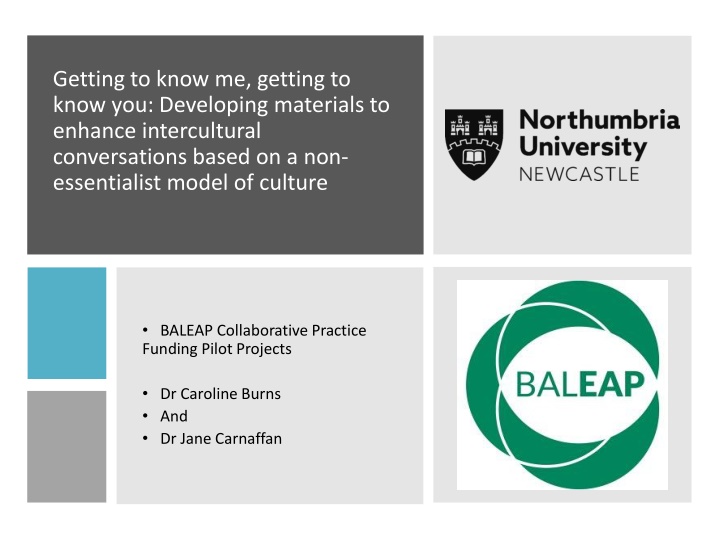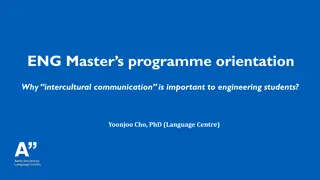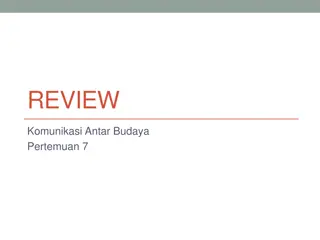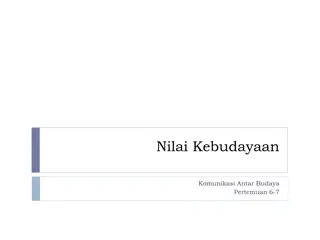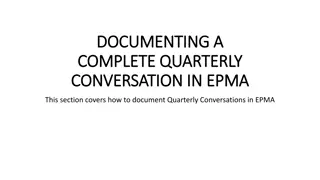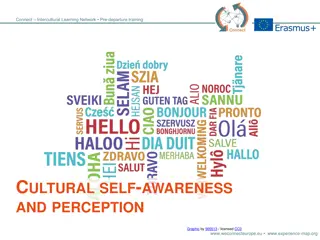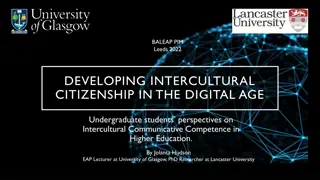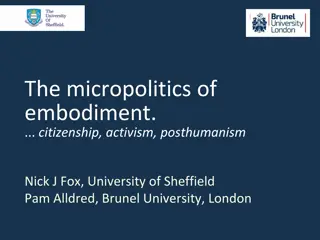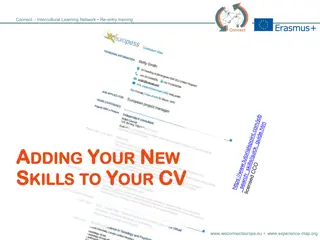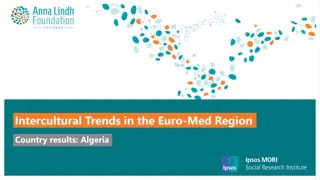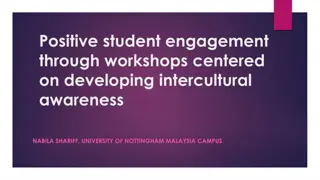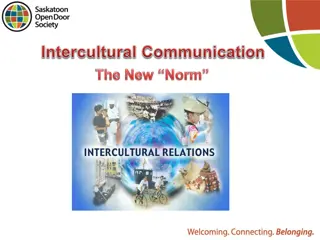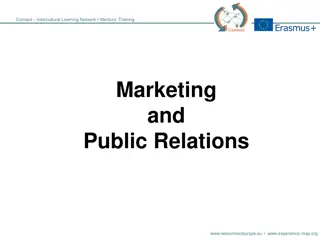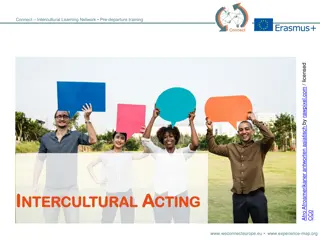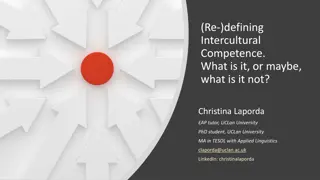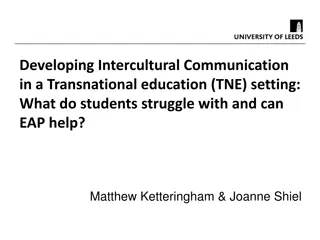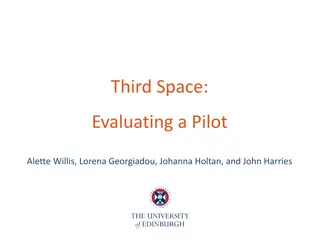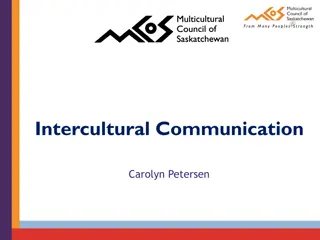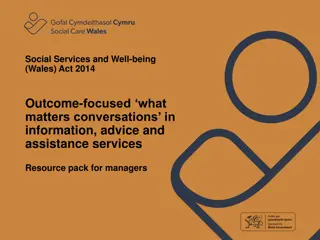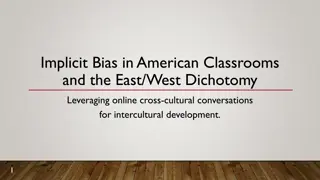Enhancing Intercultural Conversations with Non-Essentialist Model
Collaborative project focuses on developing materials for intercultural communication based on a non-essentialist view of culture. Aims to bridge cultural divides, celebrate complexity of identity, and improve teamwork skills through dynamic and inclusive approaches. Emphasizing the importance of intercultural competence in academic and professional settings, the initiative seeks to create resources for diverse cohorts and contexts, underpinned by up-to-date theoretical perspectives. By challenging outdated cultural models and promoting dialogue between staff and students, the project aims to foster a sense of belonging, enhance social relationships, and prepare individuals for success in multicultural environments.
Download Presentation

Please find below an Image/Link to download the presentation.
The content on the website is provided AS IS for your information and personal use only. It may not be sold, licensed, or shared on other websites without obtaining consent from the author.If you encounter any issues during the download, it is possible that the publisher has removed the file from their server.
You are allowed to download the files provided on this website for personal or commercial use, subject to the condition that they are used lawfully. All files are the property of their respective owners.
The content on the website is provided AS IS for your information and personal use only. It may not be sold, licensed, or shared on other websites without obtaining consent from the author.
E N D
Presentation Transcript
Getting to know me, getting to know you: Developing materials to enhance intercultural conversations based on a non- essentialist model of culture BALEAP Collaborative Practice Funding Pilot Projects Dr Caroline Burns And Dr Jane Carnaffan
The project The project brings together academics and student support professionals from Northumbria and Nottingham universities to develop teaching and learning resources for Intercultural Communication based on a non-essentialist model of culture (Holliday, 2016; 2018). With expertise in healthcare, tourism, cultural studies and EAP, the team will produce materials for use with a range of cohorts, i.e. different disciplines, small/large groups, online/face-to-face, underpinned by a shared theoretical perspective.
The rationale Intercultural communication is essential for success at university and beyond (Jones, 2013). Students must relate to one another socially to feel a sense of belonging to the community, while participation in multicultural teamwork is often part of teaching, learning and assessment practices. Employers emphasise the need for intercultural competence (British Council, 2013; CIHE, 2011), yet as the above literature indicates, divides between students of different national and ethnic groups persist, and employers continue to see a skills deficit in this area.
Intercultural communication is taught in various ways, but too often hinges on outdated, simplistic models of culture, which emphasise national identity and cultural difference. This can lead to stereotyping and division, and does not produce the communication skills employers currently require (Kassis-Henderson, Cohen and McCulloch, 2018). This project aims to leverage cutting-edge theory in intercultural communication, where culture is conceived as fluid, dynamic, contested and ambiguous, where the complexity of identity is explored and celebrated to build bridges between self and other and improve teamwork. A need for dialogue in the curriculum where staff and students can learn from and with each other has been identified (Burns, 2018). This project will develop resources to support this approach.
Intercultural communication is taught by different educators, including EAP practitioners, student support services and discipline specialists, but rarely do they work together to produce a range of materials for differing contexts and cohorts, which are underpinned by a shared up-to-date theoretical base, as is proposed here. The proposal builds on presentations at BALEAP Conference 2019, Cultnet 2019 and BAAL 2019).
The outputs A one-day workshop for the wider community to feedback and develop our ideas. An interactive website will be designed to disseminate our materials and collect staff/student feedback. Presentation of project at the BALEP PIM April 2021 and Cultnet conference in April 2021 Academic article
Wed appreciate your thoughts Would you consider using any of the materials up there? Would you consider contributing to this resource bank yourself? We welcome any feedback which will help us to make the website useful and engaging.
References (1) British Council (2013) Culture at Work Available at: https://www.britishcouncil.org/research-policy-insight/policy-reports/culture- work-intercultural-skills-workplace Burns, C. (2018) Developing a sense of self-in-the-world: staff and student narratives from a post-1992 university in the north of England . Unpublished EdD thesis. Available at: https://core.ac.uk/download/pdf/334997481.pdf CIHE (Council for Industry and Higher Education), (2011). Global Graduates into Global Leaders. Available at: https://www.ncub.co.uk/index.php?option=com_docman&view=download&alias= 42-global-graduates-into-global-leaders&category_slug=publications&Itemid=2728
References (2) Holliday, A. (2016). Difference and awareness in cultural travel: negotiating blocks and threads . Language and Intercultural Communication, 16 (3), 318-331 Holliday, A. (2018) Understanding Intercultural Communication: Negotiating a Grammar of Culture. 2ndedn. Oxon: Routledge Jones, E. (2013) Internationalization and employability: the role of intercultural experiences in the development of transferable skills . Public Money and Management. 33 (2), 95-104 Kassis-Henderson, J. Cohen, L. and McCulloch, R. (2018) Boundary Crossing and Reflexivity: Navigating the Complexity of Cultural and Linguistic Identity. Business and Professional Communication Quarterly, 81 (3), 304-27
